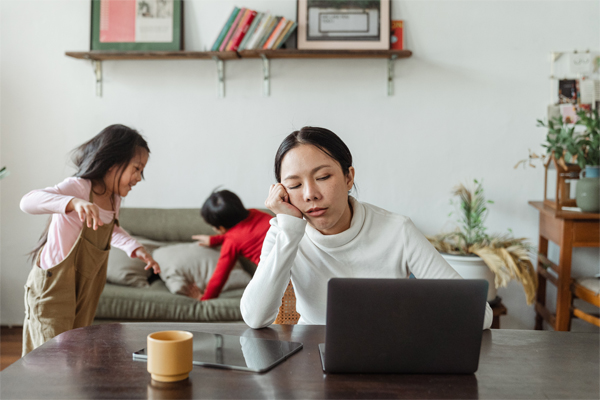New research has revealed that disabled mothers are three times more likely to have lost their job during the pandemic; that’s 20% of disabled mothers compared to 7% of non-disabled mothers, according to leading gender equality campaigners.
According to the study carried out by the Fawcett Society, The UK Women’s Budget Group, Engender and Close the Gap (Scotland), Women Equality Network Wales and Northern Ireland Women’s Budget Group (NIWBG), 58% of disabled mothers are struggling to make ends meet; compared to 36% of non-disabled mothers. Women have been hit hard by the pandemic and mothers have been hit harder. This new data, however, reveals the acute impact Covid-19 is having on disabled mothers.
The findings also found that 49% of disabled mothers have been furloughed compared to 34% of non-disabled mothers. The research shows that the pandemic is continuing to amplify disadvantages experienced by disabled parents. The campaigners are therefore urging the UK Government to take “decisive action” to tackle this.
FINANCIAL & HEALTH BARRIERS
High levels of anxiety were also reported by 62% of disabled mothers, compared to 38% of non-disabled mums. Disabled parents already face financial, social and health barriers. This research shows that the pandemic has compounded these and is likely to have a lasting impact on work. For example:
- One in five of disabled parents believe they were unfairly chosen for furlough because of their race, sex, age, disability, or health condition; compared to one in 10 non-disabled parents.
- Around 54% of disabled mothers reported that they are worried about their job prospects in the next 12 months; compared to 50% of non-disabled mothers.

DISPROPORTIONATE IMPACT ON DISABLED MUMS
“We know the pandemic has impacted on women – and particularly mothers – disproportionately; and disabled mothers are facing this on multiple fronts,” stated Felicia Willow, Fawcett Society’s Chief Executive. “The current blanket policy response to the pandemic does not address these intersecting characteristics; and widens the gulf further between disabled and non-disabled parents. We urgently need to see the Government prioritise women and equality; and redress the unequal impact of both Covid-19 and its own policy response to the pandemic.”
That includes “increasing Employment Support Allowance payments in line with the £20 Universal Credit uplift”; and require “all jobs to be made flexible to continue to support Disabled people to work once the pandemic is over”, she added.

MAJOR DISRUPTION
The evidence shows that disabled people have lacked access to food and social care; and suffered higher death rates compared to non-disabled people. Disabled fathers have also faced major disruptions to their lives and work, experiencing high rates of furlough and jobs loss. In addition, research on parents of disabled children has found that informal and formal support has decreased; and half of these families have lost income because of the pandemic.
The impact on mental health is also concerning. Disabled mothers reported the highest levels of anxiety. When asked to identify their anxiety level on a scale of 1 to 10 (with 1 being the lowest level), disabled mothers reported an average anxiety level of 6; compared to an average of 4.2 among mothers without a disability. High levels of anxiety (6 to 10) were reported by 62% of disabled mothers; compared to 38% of non-disabled mothers, 49% of disabled fathers and 31% of non-disabled fathers.
“It is not surprising that disabled mothers have been hit harder in the labour market. Although disabled women’s employment has increased by 11.6% in the past even years, they are more likely to be in low-paid jobs; and one in five employers are still hesitant to employ a disabled person,” added Dr Mary-Ann Stephenson, Director of the UK Women’s Budget Group. “We have continuously highlighted the importance of reinstating pay gap reporting at the earliest possible opportunity; and introducing accountability measures to avoid disproportionate redundancies for vulnerable groups, which includes disabled people as well as those with caring responsibilities, who are more likely to be women.”
ADDITIONAL FINANCIAL PRESSURE & LOSS
Furthermore, research shows that women are more likely than men to have had their wages “docked by 20% by being on furlough”, pointed out Stephenson. That places “additional financial pressure”, for disabled women who are on low pay. “Disabled people were already facing on average an extra £583 in costs per month due to their impairment or condition; and yet the Government has failed to acknowledge the significant financial strain this pandemic is having on disabled people. The decision not to raise legacy benefits in line with the Universal Credit uplift has particularly impacted disabled people; and the Government needs to address this as a priority,” she added.
Rebecca Graham from Standard Life Foundation agrees: “We have seen that the effects of the pandemic; and lockdowns have been uneven in all sorts of ways. The findings regarding the effects of disabled parents’ work, finances and mental health are of great concern. The data speak to a need for a targeted response throughout and following the pandemic that recognises the existing barriers faced by disabled parents, in order to reduce inequalities that have widened over the last year.”

LONG-STANDING INEQUALITIES
“One year on from the beginning of the pandemic, the evidence continues to mount that those being hit hardest are those who experienced inequalities pre-pandemic,” noted Catherine Fookes, Director of Women’s Equality Network Wales. “As this polling clearly demonstrates, this notably includes disabled people, with disabled women particularly likely to be impacted disproportionately in financial and mental health terms. We must see a Green and Caring Recovery to remake our economy and address long-standing inequalities that have been exacerbated by the pandemic.”
The disproportionate impact of the pandemic on disabled people has only “highlighted pre-existing inequalities”, according to Alexandra Brennan, Coordinator at Northern Ireland Women’s Budget Group. “Although we are entering a period of recovery, providing adequate health and economic support to disabled people must be made a priority. The collected data is evidence of why all decision-making, Covid-19-related and not, must take into account the different experiences and needs of disabled people.”

GOVERNMENT ACTION NEEDED
According to gender equality campaigners, the Government and local authorities must acknowledge the disproportionate impact the pandemic has had on disabled parents – particularly disabled mothers. They recommend that the Government take steps in the following areas:
Supporting disabled women in work
- Make clear to employers that a failure to make reasonable adjustments for disabled workers, such as providing PPE or allowing home working where possible, is a form of unlawful discrimination.
- Ensure disabled people are not being unfairly chosen for redundancy by requiring employers with more than 250+ employees to report redundancies due to the pandemic by protected characteristic including sex and disability.
- Require all jobs to be made flexible, unless there is a legitimate business requirement not to, in order to continue to support disabled people to work from once the pandemic is over.
Put in place a stronger safety net
- Increase Employment Support Allowance payments in line with the rise in Universal Credit and Working Tax Credit. At present, up to 2 million disabled people have been left behind by the necessary and welcome £20 increase in payments for other benefits; for no reason other than that they have the misfortune to be on legacy benefits.
- End the two-child limit and make advance payments of Universal Credit grants instead of loans. Abolish the benefits cap to ensure households with disabled people claiming benefits get the support they need.
- Ensure that all workers have access to statutory sick pay and increase the level it is paid at.
- Increase Local Housing Allowance to the 50th percentile to support disabled renters.
Improve support for parents and children
- Work with local councils to assess and provide sufficient support for disabled parents facing increased pressures as a result of school closures/lockdown impacts.
- Work with schools to support shielding families to continue their children’s education.
Oversee Care Act easements
- Require councils enacting Care Act easements to release a document on how they are continuing to deliver duty of care to disabled people; and how they made the decision to take that option and when it will be reviewed.
- The Government should review the suspension of Care Act duties no less than every three months; reviewing its impact for disabled people who receive care funded by social services. This should also assess how the suspension is impacting those who have multiple protected characteristics; such as disabled Black and Minority Ethnic groups.
Address the practical needs of disabled people
- Ensure information is available in accessible formats. This includes Easy read, Large print, and in British Sign Language (BSL) and in different national languages.
- Make sure all essential public broadcasts are simultaneously translated into BSL.
- Ensure people are aware of the alternative services and volunteer programmes; and how to access them including for those not able to access the internet.
- Increase funding to both women’s organisations and mental health service providers working directly with disabled women; and provide training to help disabled women access the support they need at this psychologically challenging time.




































